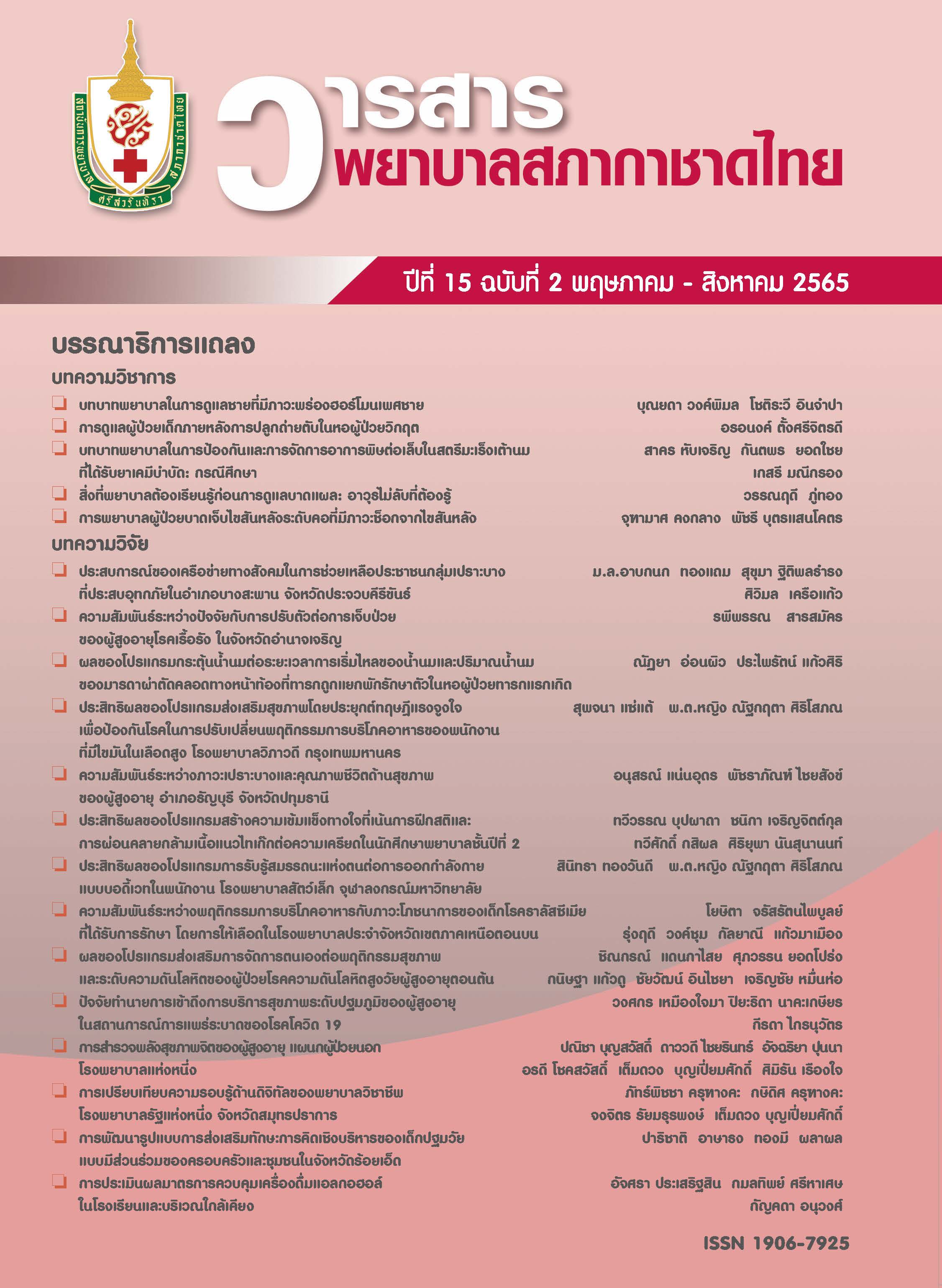Survey of Resilience Quotients in Older Adults at Outpatient Departments of Public Hospitals
Keywords:
resilience quotient, the elderly, outpatientAbstract
Resilience Quotient refers to the ability of the elderly who were able to recover quickly from difficult conditions and live happily. This research aims to study the Resilience Quotient of 135 elderly people who availed of services at the Outpatient Department of Queen Savang Vadhana Memorial Hospital, The Thai Red Cross Society between January 2020 and April 2021. The Cronbach Alpha Coefficient of the Resilience Quotient Assessment form for the Thai Elderly was 0.83, which was then analyzed by descriptive statistics.
The results of the study revealed that more than half of the participants were female (60.0%) in the early old-aged group (60-69 years old, 49.6%). Half of this group perceived themselves as healthy (53.3%), but the majority had underlying diseases (81.0%), and all had sufficient financial support to live normally (88.1%). Most of them experienced adversity (70.4%). Their total resilience was at the high level (57.8%) followed by the highest level (40.0%). Their mental strength was found at the highest score (52.6 %), followed by four aspects: relaxation and problem-solving (64.4%), religious belief (61.5%), social support (58.5%, and interrelation (57.8%).
Research recommends that the resilience quotient in older adults should promote the application of strategies in terms of mental strength, relaxation and problem-solving, and religious belief.
References
Chunharas S, Damrikarnlerd L, Kaewket W, Thananchai C, editors. Situation of the Thai elderly 2008 [Internet]. 2009 [cited 2022 Jan 21 ]. Available from: https://thaitgri. org/?p=36180
Yodphet S, Phattanasri P, Sakdap T. The final report, the lessons learned from the best practices in schools and seniors’ clubs with knowledge management activities. Bangkok: J Printing; 2017. (in Thai)
Tornstam L. Gero-transcendcncc: a reformulation of the disengagement theory. Aging Clin Exp Res 1989;1:55–63. https://doi.org/10.1007/BF03323876
Intasit S, Julkiri S, editors. Plean Rai Klay Pen Dee: resilience quotients. 4th ed. Bangkok: Beyond Publishing; 2019. (in Thai)
Institute for Population and Social Research, Mahidol University and Foundation of Thai Gerontology Research and Development institute (TGRI). Situation of Thai Elderly 2020. Nakorn Pathom: Printery. (in Thai)
Chaosuansreecharoen KR, Chaosaunsreecharoen P, Khongsanit S. Predicting factors of resilience among the elderly residents of nursing home in Southern Thailand. Journal of Mental Health of Thailand 2019;27(2):65-79. (in Thai)
Parayat C, Kangchai W, Somanusorn S. Predicitve factors of resilience among elderly. The Journal of Faculty of Nursing Burapha University 2016;24(2):97-106. (in Thai)
Koolnaphadol P, Haenjohn J. Education and development of resilience among elderly by integrating the participation process of the family and civil society networks. Nonthaburi: Health Systems Research Institute (HSRI); 2015. (in Thai)
Sasuad K. Factors affecting the quality of life of the elderly in the Eastern Province. NRRU Community Research Journal 2017;11(2):21-38. (in Thai)
Photipim M, Bonyaphagorn S, Bunyaphagorn J, Ketbumroong V, Norkaew J, Sungwalee W, Chavengkun W. Factors related to the resilience quotient of the older adults living in a community, Nakhon Ratchasima Province. Journal of Vongchavalitkul University 2021;34(1):22-33. (in Thai )
Chunsorn N. Kangchai W. Rattanajarana S. Predictive factors of resilience among elderly with diabetes. Journal of Nursing and Health Sciences 2018;12(2):12-24. (in Thai)
Yamane T. Statistics: an introductory statistics. 2nd ed. New York: Harper & Row; 1973.
Maneerat S, Isaramalai S, Boonyasopun U. A conceptual structure of resilience among Thai elderly. International Journal of Behavioral Science 2011;6(1):24-40
Boonsawad P, Petchlorlian A, Tongboonchoo C, Rattanavicha W, Duangduen Y. Resilience in older adults at Wellness Center. J Royal Thai Army Nurses 2020;21(3): 481-90. (in Thai)
Wagnild G. Resilience and successful aging. Comparison among low and high income older adults. J Gerontol Nurs 2003;29(12):42-9. doi: 10.3928/0098-9134-20031201-09
Rezaei M, Izadi-Avanji FS, Safa A, Fernanda Cal S. The impact of resilience on the perception of chronic diseases from older adults’ perspective. JCCNC 2018;4(4):231-39. doi:10.32598/jccnc.4.4.231
Boonsawad P, Sethabouppha H, Lasuka D, Muecke MA. An ethnography: How does Buddhist doctrine, a local wisdom, affect older Thai villagers’ well-being? Pacific Rim Int J Nurs Res 2016;20(3):252-65.
Pathike W. Wisitcharoen K. Community nurses’ roles to promote resilience in Thai older people. Journal of Health Science Boromarajonani College of Nursing Sunprasitthiprasong 2019;3(1):1-12. (in Thai)
Musiksirijirakun T, Sawangsopakul B. Resilience, family relationships, social participation activities, life satisfaction of elderly, Tambon Bang Rak Phatthana, Amphoe Bang Bua Thong, Nonthaburi Province. Journal of Humanities and Social Sciences Mahasarakham 2016;35:75-86. (in Thai)
Cossío-Torres P, Padrón-Salas A, Sathiyaseelan A, Soria-Orozco M, Nieto-Caraveo A. Psychosocial correlates of resilience among older adults in Mexico. Biomed Pharmacol J 2019;12(2):825-32.
Thongkhum K, Peungposop N, Sakunpong N. Resilience in the elderly: concept and approaches to promoting resilience. The Journal of Faculty of Nursing Burapha University 2021;29(1):105-16. (in Thai)
Downloads
Published
Issue
Section
License
Copyright (c) 2022 Srisavarindhira Thai Red Cross Institute of Nursing

This work is licensed under a Creative Commons Attribution-NonCommercial-NoDerivatives 4.0 International License.
เนื้อหาบทความหรือข้อคิดเห็นต่างๆ ในวารสารพยาบาลสภากาชาดไทยนี้ เป็นความคิดเห็นของผู้เขียนบทความ ไม่ใช่ความเห็นของกองบรรณาธิการ หรือสถาบันการพยาบาลศรีสวรินทิรา สภากาชาดไทย






